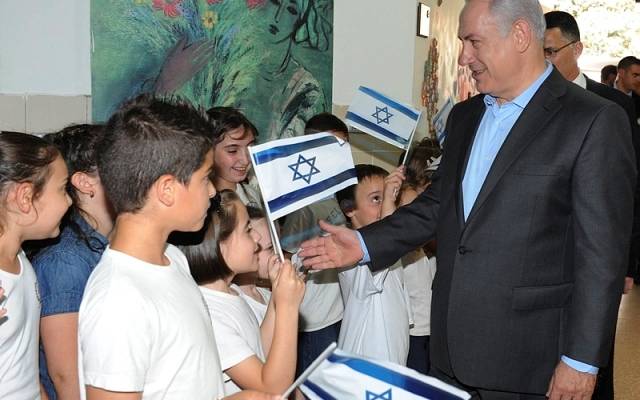The study, by IMPACT-se, showed that, as opposed to Palestinian textbooks, Israeli textbooks see peace as the ultimate goal. The books acknowledge a Palestinian presence in Israel before 1948, the development of a national Palestinian identity and different aspects of the Palestinian narrative, rationale and experiences, including Palestinian suffering.
An examination of the Israeli formal education system’s attitudes toward Palestinians, the Palestinian nationality and the Israeli-Palestinian peace process shows that Israeli textbooks continue to foster the idea that peace with Palestinians is both desirable and possible—though also complicated and difficult to achieve, and this despite the deterioration of the Israeli-Palestinian peace process in the past two decades.
The study comprehensive study was conducted by the Institute for Monitoring Peace and Cultural Tolerance in School Education (IMPACT-se) which examined 123 textbooks for grades 7–12 during 2000–2017.
The textbooks examined in the study included books on history, civics, geography, Jewish heritage and religious studies, Hebrew language and literature and Arab language for the Jewish-Israeli sector.
The study showed that Israeli textbooks see peace as the ultimate goal, and depict it as highly desirable and achievable, while war is considered a negative event, though at times necessary. The books acknowledge a Palestinian presence in Israel before 1948, the development of a national Palestinian identity and different aspects of the Palestinian narrative, rationale and experiences, including Palestinian suffering.
Maps also recognize the physical presence of Palestinians in the area, including major Palestinian cities while marking Palestinian Authority territories, including the “Green Line” and at times detailing the A, B and C territories described in the Oslo Accords.
Unlike the Palestinian Authority textbooks, Israeli textbooks do not include messages of incitement or stereotypes against Palestinians.
In some cases, Israeli textbooks include themes such as ethnocentrism and a perception of Israel and Jews as the main victims of war and violence, who only react to Arab or Palestinian hostility. However, it could be argued that such trends of self-justification are natural for government-approved textbooks, especially for a society with a protracted conflict.
Similarly, the study showed that Israeli textbooks explain the complexities and political disagreements within Israeli society but maintain a clear message of tolerance and coexistence with regard to Arab and Muslim minorities, and toward Palestinian-Israeli citizens in particular. Textbooks include respectful representation of Arab and Muslim culture and heritage, including direct and personal narratives of Arab and Muslim minorities in Israel.
The representations were analyzed according to criteria with recommendations based on UNESCO-derived IMPACT-se guidelines regarding peace and tolerance education
The study serves as a rebuttal to several researchers who have described Israeli textbooks as a tool to advance a collective ethnocentric Zionist narrative while promoting hostility, stereotypes and prejudice toward Palestinians, stating that the Israeli educational curriculum has damaged students’ attitudes toward Palestinians and any Israeli-Palestinian peace agreements.
Inverted Trend in Palestinian Education
While Israel can clearly demonstrate it educates towards peace and tolerance, the Palestinians do the reverse. Rather than promoting peace, the Palestinian educational system continues to glorify terrorists and promote death and destruction.
The Palestinian Authority educational system continues to poison the minds of Palestinian children by educating them to hate Israel and Israelis and through terror-promoting messages. They even use cultural mediums such as school plays to promote these dangerous messages.
The official Palestinian Authority (PA) education system is teaching the next generation to hate Israel and Israelis, using the most virulent anti-Semitic concepts and materials to convey its messages and thus dashing any hopes for a peaceful future.
By: Max Gelber, United with Israel
Do You Love Israel? Make a Donation - Show Your Support!
Donate to vital charities that help protect Israeli citizens and inspire millions around the world to support Israel too!
Now more than ever, Israel needs your help to fight and win the war -- including on the battlefield of public opinion.
Antisemitism, anti-Israel bias and boycotts are out of control. Israel's enemies are inciting terror and violence against innocent Israelis and Jews around the world. Help us fight back!























